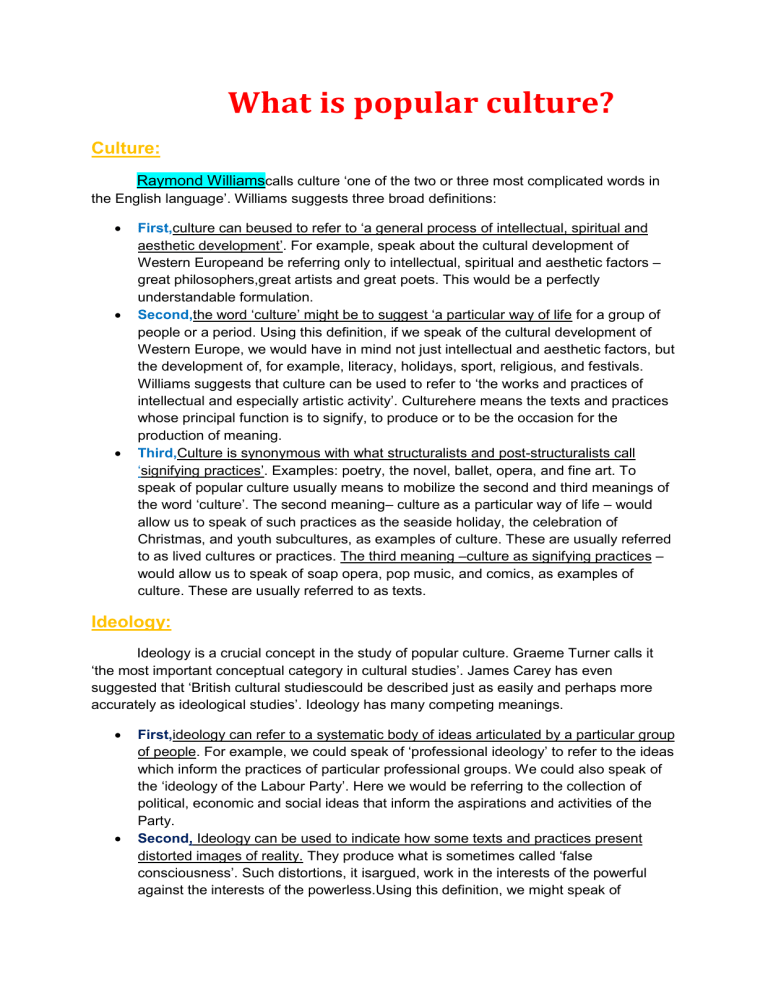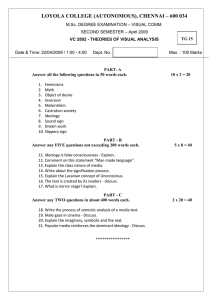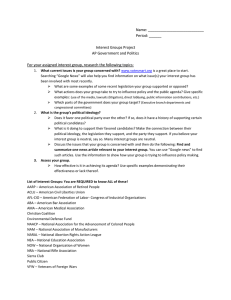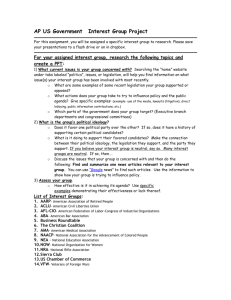1-What-is-popular-culture
advertisement

What is popular culture? Culture: Raymond Williamscalls culture ‘one of the two or three most complicated words in the English language’. Williams suggests three broad definitions: First,culture can beused to refer to ‘a general process of intellectual, spiritual and aesthetic development’. For example, speak about the cultural development of Western Europeand be referring only to intellectual, spiritual and aesthetic factors – great philosophers,great artists and great poets. This would be a perfectly understandable formulation. Second,the word ‘culture’ might be to suggest ‘a particular way of life for a group of people or a period. Using this definition, if we speak of the cultural development of Western Europe, we would have in mind not just intellectual and aesthetic factors, but the development of, for example, literacy, holidays, sport, religious, and festivals. Williams suggests that culture can be used to refer to ‘the works and practices of intellectual and especially artistic activity’. Culturehere means the texts and practices whose principal function is to signify, to produce or to be the occasion for the production of meaning. Third,Culture is synonymous with what structuralists and post-structuralists call ‘signifying practices’. Examples: poetry, the novel, ballet, opera, and fine art. To speak of popular culture usually means to mobilize the second and third meanings of the word ‘culture’. The second meaning– culture as a particular way of life – would allow us to speak of such practices as the seaside holiday, the celebration of Christmas, and youth subcultures, as examples of culture. These are usually referred to as lived cultures or practices. The third meaning –culture as signifying practices – would allow us to speak of soap opera, pop music, and comics, as examples of culture. These are usually referred to as texts. Ideology: Ideology is a crucial concept in the study of popular culture. Graeme Turner calls it ‘the most important conceptual category in cultural studies’. James Carey has even suggested that ‘British cultural studiescould be described just as easily and perhaps more accurately as ideological studies’. Ideology has many competing meanings. First,ideology can refer to a systematic body of ideas articulated by a particular group of people. For example, we could speak of ‘professional ideology’ to refer to the ideas which inform the practices of particular professional groups. We could also speak of the ‘ideology of the Labour Party’. Here we would be referring to the collection of political, economic and social ideas that inform the aspirations and activities of the Party. Second, Ideology can be used to indicate how some texts and practices present distorted images of reality. They produce what is sometimes called ‘false consciousness’. Such distortions, it isargued, work in the interests of the powerful against the interests of the powerless.Using this definition, we might speak of capitalist ideology. What would be intimatedby this usage would be the way in which ideology conceals the reality of dominationfrom those in power: the dominant class do not see themselves as exploiters or oppressors.And, perhaps more importantly, the way in which ideology conceals the reality ofsubordination from those who are powerless: the subordinate classes do not see themselvesas oppressed or exploited. This definition derives from certain assumptionsabout the circumstances of the production of texts and practices. It is argued that theyare the superstructural ‘reflections’ or ‘expressions’ of the power relations of the economicbase of society. This is one of the fundamental assumptions of classicalMarxism. Here is Karl Marx’s famous formulation:In the social production of their existence men enter into definite, necessary relations,which are independent of their will, namely, relations of production correspondingto a determinate stage of development of their material forces of production.The totality of these relations of production constitutes the economic structure ofsociety, the real foundation on which there arises a legal and political superstructureand to which there correspond definite forms of social consciousness. Themode of production of material life conditions the social, political and intellectual life process in general. Marx is suggesting that the way a society organizes the means of its economicproduction will have a determining effect on the type of culture that society producesor makes possible. We can also use ideology in this general sense to refer to power relations outside those of class. For instance, feminists speak of the power of patriarchal ideology, andhow it operates to conceal, mask and distort gender relations in our society. Third,ideology uses the term to refer to ‘ideological forms’.This usage is intended to draw attention to the way in which texts (television fiction,pop songs, novels, feature films, etc.) always present a particular image of the world. Texts are said to take sides,consciously or unconsciously, in this conflict. The German playwright Bertolt Brechtsummarizes the point: ‘Good or bad, a play always includes an image of theworld. . . . There is no play and no theatrical performance which does not in some wayaffect the dispositions and conceptions of the audience. Art is never without consequences’. (All texts are ultimately political.) Fourth,ideology is one associated with the early work of the Frenchcultural theorist Roland Barthes. Barthes arguesthat ideology (or ‘myth’ as Barthes himself calls it) operates mainly at the level of connotations,the secondary, often unconscious meanings that texts and practices carry, orcan be made to carry. For example, a Conservative Party political broadcast transmittedin 1990 ended with the word ‘socialism’ being transposed into red prison bars. Whatwas being suggested is that the socialism of the Labour Party is synonymous withsocial, economic and political imprisonment. For Barthes, this would be a classic example of the operations of ideology, the attemptto make universal and legitimate what is in fact partial and particular; an attemptto pass off that which is cultural (humanly made) as something which is natural (just existing). Fifth, this definition was very influential in the 1970s and early 1980s. Itis the definition of ideology developed by the French Marxist philosopher LouisAlthusser.Althusser’s main contentionis to see ideology not simply as a body of ideas, but as a material practice. Whathe means by this is that ideology is encountered in the practices of everyday life andnot simply in certain ideas about everyday life. Using this definition, we could describe the seaside holiday or the celebrationof Christmas as examples of ideological practices. Culture and ideology do cover much the same conceptual landscape. The main difference between them is that ideology brings a political dimension to the shared terrain. Popular Culture: Williams (1983) suggests four current meanings: - Well-liked by many people. -Inferior kinds of work. -‘work deliberately setting out to win favour with the people’. -‘culture actually made by the people for themselves. First,popular culture is simply culture that is widely favoured or well-liked by many people. And, such a quantitative index would meet the approval of many people.We could examine sales of books, sales of CDs and DVDs. We could also examineattendance records at concerts, sporting events, and festivals. Any definition of popular culture must include a quantitative dimension. Second, popular culture is the culture that is left over after we have decided what high culture is.Culture as inferior culture. What the culture/popular culture test might include is arange of value judgements on a particular text or practice. For example, we might wantto insist on formal complexity. In other words, to be real culture, it has to be difficult. The Frenchsociologist Pierre Bourdieu argues that cultural distinctions of this kind are often used to support class distinctions. Taste is a deeply ideological category: it functions asa marker of ‘class’. Third,popular culture is ‘mass culture’. It is mass-producedfor mass consumption. Its audience is a mass of non-discriminating consumers.The culture itself is formulaic, manipulative (to the political right or left,depending on who is doing the analysis). It is a culture that is consumed with brain numbedand brain-numbing passivity. However, not all popular culture/mass culture consumers are cultural dupes.Origin of mass culture: For some cultural critics working within the mass culture paradigm, mass culture is not just an imposed and impoverished culture, it is in a clear identifiable sense an imported American culture: ‘If popular culture in its modern form was invented in any one place, it was . . . in the great cities of the United States, and above all in New York’. Forth, popular culture is the culture that originates from ‘the people’. It takes issue with any approach that suggests that it is something imposedon ‘the people’ from above. According to this definition, the term should only be usedto indicate an ‘authentic’ culture of ‘the people’. This is popular culture as folk culture: a culture of the people for the people. Fifth,this definition of popular culture, then, is one that draws on the political analysisof the Italian Marxist Antonio Gramsci, particularly on his development of theconcept of hegemony. Gramsci uses the term ‘hegemony’ to refer to the way in which dominant groups in society, through a process of ‘intellectual and moral leadership’ seek to win the consent of subordinate groups in society. Popular culture is a fertile soil used by dominant groups to reproduce and maintain hegemony.Ideology and popular culture are inextricably linked. There is a production process of meaning through consumption.Stuart Hall’s theory of reception: There are 3 models or reading a text: - Preferred model. - Negotiated model. - Oppositional model. Sixth,this definition of popular culture is one informed by recent thinking around thedebate on postmodernism.According to postmodernism, the distinction between what is high culture and what is low culture becomes thin, blurred and no longer recognized.“Everything solid melts into the air” What all these definitions have in common is the insistence that whatever else popular culture is, it is definitely a culture that only emerged following industrialization and urbanization.It is an outcome of capitalism, materialism and quick economic benefits. Conclusion: Storey begins by first identifying culture, utilizing Raymond Williams' approach which defines culture as the overall process of "intellectual, spiritual, and aesthetic development" that can also be the particular way of life for a group or a time period that is often manifested through "the works and practices of intellectual and especially artistic activity" . Culture, in Storey's estimation, exists to facilitate the creation and justification of intellectual and creative works.Because ideology is a core component of cultural studies, Storey also takes time to define it, using the standard definitions of systematic bodies of ideas from a given group that may potentially distort or present otherwise false images of reality and influence the overall power relationships in society; Storey also points out that ideology can be used to refer to the forms that ideological culture may take (such as television, movies, or other forms of popular culture) or the unconscious meanings such media may carry as well as the rituals a population may undertake. Storey also provides several definitions of popular culture due to the often contentious debates over the meaning of the term. Popular culture may be: That culture that is liked by many people. The culture left over after society has decided what "high culture is". Culture aimed at a mass audience (this often suggests that popular culture is inherently commercial in nature). Culture that originates from "the people" rather than imposed upon them by cultural elites and "the above". Culture that is the domain of an on-going aesthetic debate between dominant and lower classes. Virtually indistinct from high culture, in the postmodern view. Regardless of what definition one chooses to use, Storey identifies that popular culture is a form of culture that comes into prominence after the Industrial Revolution. Moreover,popular culture is "historically variable" and different theoretical perspectives have focused on different elements of it.


